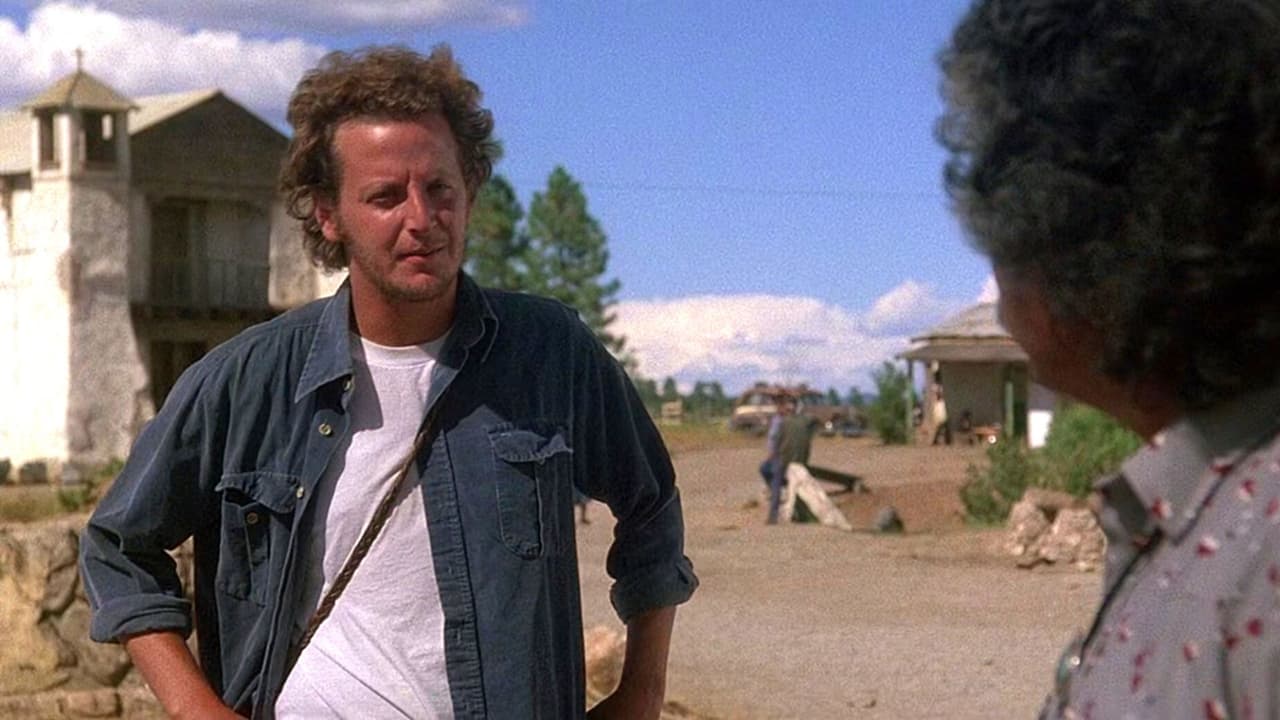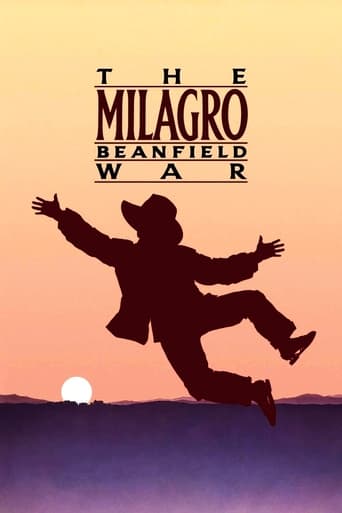Linbeymusol
Wonderful character development!
WasAnnon
Slow pace in the most part of the movie.
Aneesa Wardle
The story, direction, characters, and writing/dialogue is akin to taking a tranquilizer shot to the neck, but everything else was so well done.
Lidia Draper
Great example of an old-fashioned, pure-at-heart escapist event movie that doesn't pretend to be anything that it's not and has boat loads of fun being its own ludicrous self.
Pat Wolf
This movie was very powerful in the sense that it showed how much as Americans we value real estate. The Devine plan for Milagro was to put up a resort, a lake, and a golf course; and by doing so it had no regards for the native population of Milagro. They had been there for hundreds of years, but the town had changed during that time. In the past years, poverty had become noticeable in their personalities. It had always been their style of life, but now it dictated how people acted. This is a classic example of rich people wanting to buy up all the land, so they offer money to all the land owners to buy them out. As far as who held the key to the plot of the story, it was Sheriff Montoya. Although he was dealing with Ladd Devine, he ended up staying true to his native people by defending them. Twice, he stepped in during life/death situations and prevented total chaos from breaking out. Also, as far as playing their role very well, Christopher Walken did a great job playing Kryil Montana, the loose cannon, stop at nothing, wild-west vigilante out to get Mondragon. It was interesting to see how much pride Montana took in finally arresting Mondragon, but how he still had a level of respect for him when he let him go. Ruby Archuleta was the activist who made this all happen. She took a stand to defend her native people, even when at times, they didn't understand what was happening to them. She got the injustice into the hands of the right man, Charlie Bloom, an ex-lawyer and civil rights activist. He stood up for the town that wasn't even his own and printed the news about everything that was going on. It was interesting to see that some people in the town were willing to let the development happen. The US Forest Service rangers, whose families had been in Milagro all their life, were willing to turn their backs on their people and got paid off by Devine. This created most of the conflict in the movie because the first scene in which people actually pointed their guns at each other involved the rangers. They had taken Joe's cow onto national land, so they could detain it, therefore costing him $100 to retrieve it. Well everyone knew that this was by design, and the old men in Milagro were there to defend Joe all the way. Luckily Sheriff Montoya stepped in, or we would be looking at a whole different plot line. The other incident which made the movie into what it was involved Montana buying up all of Bloom's local papers and trying to burn them. But while this was going on, a gust of wind picked up all the newspapers and spread them all over town for everyone to read. As far as social justice movies go, this would go somewhere at the top of the list. It was a little different than I would have expected, in that I expected Devine to just buy Mondragon out of his property. All Joe was looking for was a decent job to pay off his bills and feed his family, so if Devine was willing to just offer Mondragon a lucrative settlement, then this wouldn't have happened. The only thing that would have made this movie better would to have been to see Bloom go to court as a civil attorney and make the whole state of New Mexico aware of the injustices that were occurring.
danappofc
I have been reading IMDb reviews for several months, but this is the first time I have felt a need to add one of my own. This is mostly a response to the detractors of this film. Since Milagro is one of my favourite movies I have ever seen, I was amazed at the vitriol it inspired in some people. At first it made me angry -- but then, it just made me sad to know that so many people are so ignorant of real life, and of the magical realities that exist in this mundane world. This film is probably the most real film about the most real people I have ever seen. Fat, rich, and greedy white men do indeed oppress good people of colour and limited means all over the world all the time, and I suspect that the critic's vitriol had its base in the fact that this movie so effectively portrays this oppression. To anyone who wants an inspiring, witty, funny, and heartfelt story about the 'little man' who successfully stands up to the Machine, this movie is a must see.
JoeytheBrit
This is one of those intelligent slow-moving tales with almost no commercial potential that somehow find themselves being made thanks to the involvement of a major star or director – Robert Redford in this case, who just happens to be both a major actor and director. The plot is fairly thin, but Redford's more interested in developing character and admiring the scenery as he does so. There's a mix of Hollywood types (Walken, Heard, Griffith, etc) and lesser-known actors, and you'd expect the bigger names to look out of place. They do look different from the town-folk of Milagro, to be sure, but, for the most part they're supposed to. Walken is a cop drafted in by land developers to step on the minor irritation initially provided by a nothing farmer when he almost inadvertently diverts water that doesn't belong to him to grow the beans that cause the frictions between the townspeople and the developers to come to a head; Heard is an outcast from the city, a 60s radical and former lawyer preciously licking his wounds in a place where he thinks trouble can't find him. They're both good, as you'd expect, but they can't compete with the fascinating character contained in the lined and sun-baked faces of the locals.It's almost a fable, this story, with some mystical elements that don't always sit comfortably with other aspects of the tale. Most of these are provided by the hermit-like old neighbour of Joe Mandragon, the film's protagonist, who holds conversations with a long-dead brother who casts shadows on walls. Richard Bradford is quite memorable as the chief bad guy, a slick white-haired type. The townspeople should be allied against him but, even as the beanfield farmer makes a stand they are too apathetic and blinkered to do so. They can't believe bad things will happen to them until they do. Had they shown a little more resolve they would have found that the people plotting to destroy their village in the process of developing a leisure resort really aren't that clever themselves – it's only their own listlessness – even Mondragon wavers when the developers offer him some construction work – that puts them in the position they find themselves.Two minor weak points: Chick Vennerra as Mondragon has a tendency to overact at times and Daniel Stern as a stranded sociology major seems almost completely superfluous to the plot.
ccthemovieman-1
This started off so well, with some absolutely beautiful New Mexico scenery, I had high hopes. Unfortunately, they were dashed the rest of the way as director Robert Redford had to shout his Left Wing politics loud and clear in our face.So what we wind up with is a low-down, dishonest greedy Right Wing big businessman running the poor little guys out of town and only those good-guy liberal activist minorities saving the day. We even get a dose of Christian bigotry here where those poor picked-on-pagan gods are run out by Christians! Well, you just know what side is going to win: yes, those wonderful left wingers, adored by the film industry.This VHS went into a garbage can where it belonged. Adios!!

